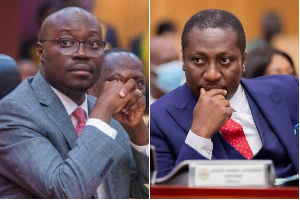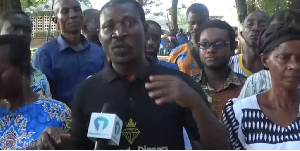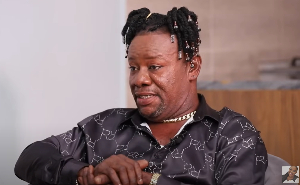By Austin Brakopowers
Ghanaians will become orphans if the three arms of government are allowed to wallow in corruption. It's the reason we don’t need to sit quiet to water down the latest allegation that has hit the legislature.
I have personally been sceptical about Members of Parliament (MP) who ride the moral horse branding everybody else but themselves as corrupt. The only time Ghanaians get to know the underhand dealings in Parliament is when a seemingly bold legislator defies the odds and exposes his colleagues in public.
Ghanaians shared the same turf with former Asikuma-Odoben-Brakwa MP, Paul Collins Appiah-Ofori during the erstwhile President John Kufuor’s government. P.C as he loved to be addressed arrogated to himself the title of anti-corruption campaigner and revealed how his colleagues New Patriotic Party (NPP) MPs and some National Democratic Congress (NDC) MPs in the Fourth Parliament were offered $5,000 each during the final vote for the sale of state company, Ghana Telecom to United Kingdom (UK)’s Vodafone plc at an estimated price of $900 million in 2008.
He was vilified, taunted by his own people and ruled out as a complete “lunatic” for doing something his colleagues had been afraid to do. He was reportedly summoned before NPP’s Disciplinary Committee to clarify his claims. P.C became a loner in Parliament after he “exposed” his colleagues.
Any lessons learnt since his disclosure?
Nine years down the line Mahama Ayariga drops another bomb shell
Exactly nine years later, Bawku Central MP, Mahama Ayariga has alleged a bribery attempt on minority members of the Appointments Committee which is similar in form to P.C. Appiah-Ofori’s claim. However, what makes this allegation about GHC3,000 bribe offered each MP different is that some key leaders of the House have been ‘implicated.’ Minority Chief Whip Alhaji Mubarak Mohammed Muntaka, First Deputy Speaker Joe Osei Owusu and Energy Minister Boakye Agyarko have been mentioned, although they have each denied the claim with two threatening to head to court.
As to whether the rush to court is an appropriate option to address the issue is a subject for another debate. But I believe the court would not bring out what many have described as “crass” corruption in Parliament if it's true.
Alhaji Muntaka has sworn by Allah on Joy FM/MultiTV’s Newsfile programme Saturday that he never gave any money to Mr Ayariga. The former Youth and Sports Minister was explicit the former Science and Technology Minister lied to the public.
The Energy Minister has also said it is unthinkable that he would bribe the minority for the express purpose of approving his nomination when the NPP wields super majority in the legislature. He said his lawyers are listening and reviewing Mr Ayariga’s expose tape and would advise him on what to do in the coming days. He, however, hinted they might drag the MP to court.
Mr Osei Owusu also said he had not dealt with Mr Ayariga and had not given any money to Alhaji Muntaka. “There is Parliament, and there is my integrity,” he told Samson Lardy Anyenini on Newsfile, vowing to sue the Bawku MP.
Any lessons yet?
Often when we talk about corruption, we are quick to point to the Executive arm of government as the key perpetrator of the number one issue that’s to blame for our underdevelopment. We accuse the President, Ministers and other public officials clearly leaving out the legislature and judiciary. We naively believe by virtue of their status, they would live up to the credos and ethos of their jobs, but sadly we get something different.
I’m sure we would have arrived at the same conclusion that the judiciary is incorruptible had we not watched Anas Aremeyaw Anas' expose of the institution. From the investigative journalist’s work, we realised how corrupt our judges have grown and why we need to focus our attention not only on the Executive, but on all three institutions.
No nation has weaned itself off corruption without a holistic approach to fighting the endemic nature of the issue. And President Nana Addo Dankwa Akufo-Addo’s pledge to fight th canker would be won if there is an effective collaboration with both Parliament and Judiciary. This means that he has to be minded about happenings within these key institutions.
If we are to subject the works and in-camera meetings of our MPs to close scrutiny, I am confident we will lose confidence in them faster than we did in former President John Mahama’s government. Like our ‘partisan’ police officers, the work being delivered by our MPs is everything, but stellar.
Their contributions to relevant bills in the House are average, yet they are quick to parade their titles everywhere they go – I’m an honourable. So what?
I will not want the Bawku Central MP’s allegation to die prematurely in the public. The reputation of Parliament has again been questioned by Mr Ayariga’s disclosure. In as much as it may be early to conclude on who is telling Ghanaians the truth, I think it is important a full scale investigation is carried out by the House to ascertain the truth.
We can decide to slide the issue as happened in the case of P.C. Appiah-Ofori, but if Parliament has anything to protect it has to be its integrity and this means ensuring an exhaustive investigation. If it has anyone to expose in this allegation that has gone international, it has to treat the issue with the seriousness it deserves to expose itself or its members.
Merely sweeping the allegation under the carpet would defeat the purpose of our fight against graft. The key responsibility lies with the three individuals cited in the allegation to support calls for a public investigation into the issue. Parliament should not keep quiet. Some steps must be taken.
I am sure Mr Ayariga was inspired by the works of Mr Appiah-Ofori, but I doubt if he had studied what became of the former legislator. In matters as the one facing Parliament, the less difficult thing to do is to sacrifice one person for everyone. It has politically been appealing for one person to die for the rest than for everyone to die for the one person. This might be the beginning of the disintegration of the NDC in opposition.
Opinions of Monday, 30 January 2017
Columnist: Austin Brakopowers



















